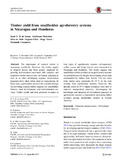Timber yield from smallholder agroforestry systems in Nicaragua and Honduras
Autor
Sousa, Kauê Feitosa Dias de.
Detlefsen Rivera, Guillermo
Virginio Filho, Elias de Melo
Tobar López, Diego
Casanoves, Fernando
Tipo
Artículo
Metadatos
Mostrar el registro completo del ítemResumen
The importance of tropical timber is increasing worldwide. However, the timber supply of tropical forests has been greatly impacted by growing deforestation associated with complex and restrictive timber harvest laws. In Central America, as well as in other developing regions, reforestation programs have often fallen short of expectations. In these cases, agroforestry proves to be a useful strategy for providing tropical timber supplies for smallholder farmers, rural development and environmental services. Timber yields and their potential revenues in four types of agroforestry systems (silvopastoral, coffee, cocoa and living fences) were researched in Nicaragua and Honduras. The results suggest that smallholder timber production in agroforestry systems is a profitable activity despite lower market prices tan commanded by timber from forests. The net value from timber sales represents 11–49 % of the total revenue from agroforestry systems. However, this amount could be 58 % higher if farmers were able to improve management practices. Encouraging the knowledge and adoption of silvicultural practices in agroforestry systems is important to increasing timber revenues among smallholder farmers in Central America.
Palabras clave
Es parte de
Programa Producción y Conservación en Bosques
URI (Enlace permanente para citar o compartir este ítem)
https://repositorio.catie.ac.cr/handle/11554/7268http://dx.doi.org/10.1007/s10457-015-9846-2
Colecciones
- Publicaciones y documentos [3814]


